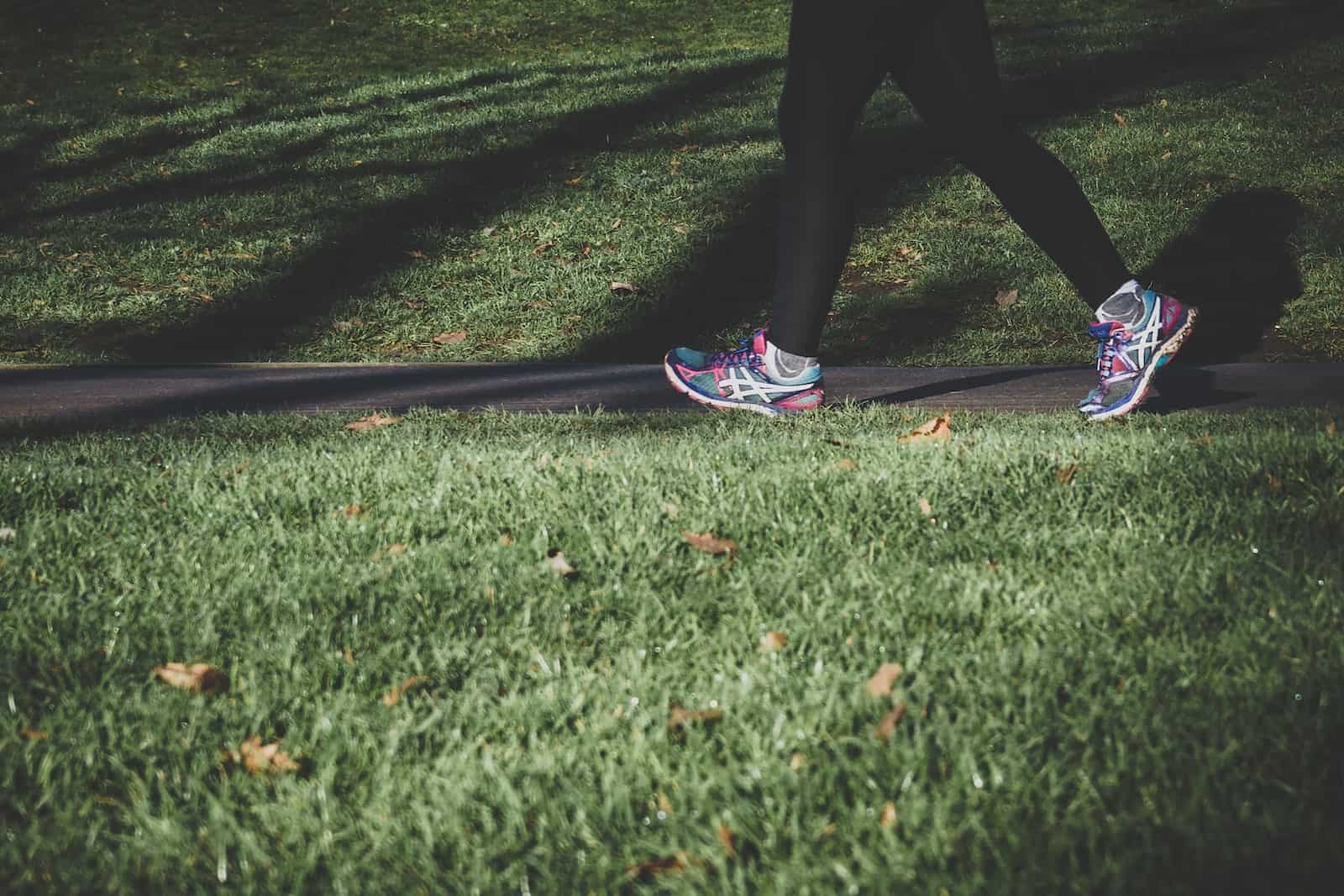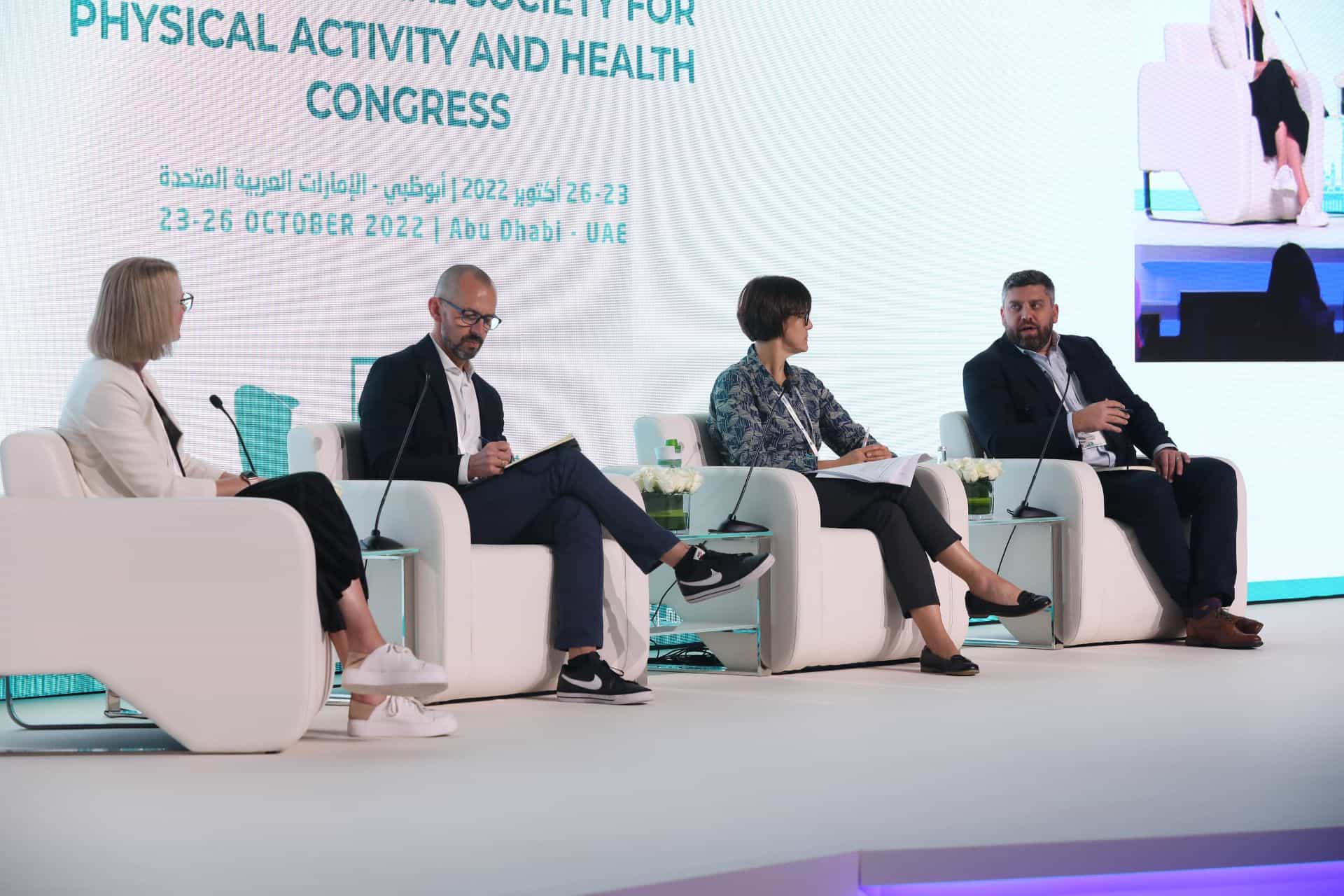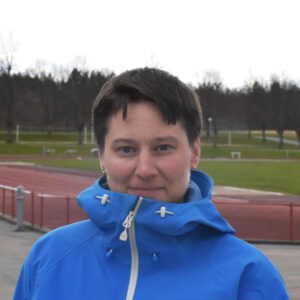Symposium
Development of health promotion in sports clubs: interventions, key skills, successes and challenges
Symposium Title: Development of health promotion in sports clubs: interventions, key skills, successes and challenges
Purpose: This symposium will discuss the implementation of health promotion in sports clubs, to highlight interventions, key skills, current successes and challenges
Description: Beyond promoting their sports, sports clubs can have a broader health and sport promotion role. Previous work has shown that health promotion in sports clubs is complex, due to their voluntary nature, their lack of know-how and the high turnover of club managers and coaches. The present symposium will discuss how sports clubs can promote health, several successes and challenges, as well as skillsets and leverages for health promotion actions. The first presentation will focus on the development of a health promoting sports club intervention in France through intervention mapping; highlighting how to co-create such interventions. The second will reflect on the evaluation of an Irish community-based initiative, ‘Ireland Lights Up”, hosted by sports clubs; showcasing the challenges when monitoring health promotion actions in sports clubs. The third presentation will explore what Dutch sports clubs do an can do to promote mental health and the successes and challenges they encounter during implementation. The fourth presentation will use a socio-ecological approach to explore factors influencing sports drop-out among Swedish youth. The fifth presentation will present results from a literature review on sport coaches’ skillsets and training needs to promote health. A discussion will be engaged with the audience on how to foster health promotion actions in sport organizations, especially by considering different conceptualizations of the relationship between health promotion and sport: health promotion in sport, through sport and health- promoting sport concepts.
Chair: Susanna Geidne, Örebro University
Presenter 1: Stacey Johnson, Institut de Cancérologie de l’Ouest et l’Université Côte d’Azur
Presenter 2: Nicola Briggs, South East Technological University
Presenter 3: Linda Ooms, Mulier Institute
Presenter 4: Beatrix Alguren, University of Gothenburg
Presenter 5: Kevin Barros, Université de Lorraine
Discussant/moderator: Aurélie Van Hoye, Université de Lorraine
Title: Development of a health promoting sports club intervention: an intervention mapping process analysis
Authors: Aurélie Van Hoye, Stacey Johnson, Florence Rostan, Fabienne Lemonnier, Benjamin Tezier, Susanna Geidne, Alex Donaldson & Anne Vuillemin
Presenter: Stacey Johnson
Background: The development of health promotion interventions in sports clubs remains a challenge. Intervention implementation in real world settings must be context dependent and specific to each sports club’s needs and objectives.
Purpose: This study mapped and analyzed the development of the multi-phase PROSCeSS intervention, designed to support sports club’s implementation of the health promoting sports club (HPSC) approach.
Methods: A case study design was used to determine how the 6-step intervention mapping method (needs assessment, matrix of change, theory of action, program design, plan for adoption and implementation and evaluation) was applied to develop the PROSCeSS intervention.
Results: The main findings include a literature review and concept mapping study as the needs assessment, a Delphi study and HPSC intervention framework to design the matrix of change, a case study among sports clubs and sports federations to select the theory of action, the intervention co-construction to create the program, results from a pilot study to validate the plan for adoption and implementation and employment of the e-PROSCeSS questionnaire and hybrid type-3 protocol as an evaluation method.
Conclusions: The research design used to develop the PROSCeSS intervention has several challenges including 1) the quality of evidence for intervention design, 2) the robustness and definition of ‘theory-based’ interventions, 3) the scale for intervention development and 4) the specificity of settings-based interventions leading to difficulty to determine appropriate evaluation methods. Nevertheless, it highlights research in action and displays how intervention development and implementation are recursive rather than linear and the necessity of including target populations along all phases of program design and implementation.
Practical implications: Settings-based interventions should consider multi-phase participatory research approaches to allow for translation from research into context specific practice.
Funding: This research was a partnership between Santé publique France, Université Côte d’Azur and Université de Lorraine.
Title: Study protocol: Capturing success factors in ‘Ireland Lights Up’—a sports-based community walking initiative.
Ms Nicola Briggs, Dr Barry Lambe, Dr Noel Richardson, Professor Niamh Murphy & Dr Aisling McGrath
South East Technological University
Background: Community-based physical activity (PA) initiatives, such as ‘Ireland Lights Up’ (ILU), supported by the Gaelic Athletic Association (GAA) and community partners, demonstrate effectiveness in enhancing PA and improving mental, social, and physical health outcomes. However, there is limited evaluation of ILU’s impact or implementation.
Purpose: This study aims to measure ILU’s effectiveness in GAA clubs, assess its impact on health and wellbeing, and explore its potential implementation in other Irish National Governing Bodies of Sport.
Methods: The research, guided by implementation science and using a mixed methods approach, will identify determinants of successful implementation across participant, club, organisation, and system levels. Barriers and facilitators will be identified, and strategies to enhance impact and sustainability will be proposed. The study will apply a hybrid type-two effectiveness-implementation design through the RE-AIM and Practical Robust Implementation and Sustainability Model (PRISM) frameworks.
Results: With a focus on engaging socially disadvantaged groups and countering physical inactivity trends, the research aims to maximise ILU’s implementation, serving as a model for other community-based approaches. Emphasising the wellbeing of vulnerable populations, the study will explore ILU’s unique role in enhancing social connectedness in local communities, addressing measurement, engagement strategies, and reaching vulnerable populations.
Conclusions: The study’s original contribution to physical activity, health promotion, and sports clubs for health lies in developing a mechanism for engaging underserved, isolated, and vulnerable populations. The findings will provide a valuable opportunity to evaluate ILU at scale, impacting population health and developing a template for other National Governing Bodies of Sport to replicate or adapt the ILU implementation model.
Practical Implications: Ultimately, the research seeks to address societal health challenges and promote inclusive community-based initiatives, offering practical implications for enhancing the reach, effectiveness, adoption, implementation, and sustainability of ILU.
Funding: Funded by the SETU PhD Scholarship Programme.
Title: Promoting mental health within sports clubs: opportunities and challenges
Linda Ooms, Wikke van Stam
Mulier Institute, The Netherlands
Background: Regular participation in physical activity in a social context, such as in a sports club, can have mental health benefits.
Purpose: To examine what Dutch sports clubs do and can do to stimulate the mental health of their participants.
Methods: Online questionnaires were sent to Dutch sport clubs (n=313). Furthermore, online group interviews were conducted with representatives of sport clubs (n=1) and of six sport initiatives (n=6) that were aimed at stimulating the mental health of participants. Also, participants in these sport initiatives (n=10) were interviewed individually.
Results: Only 5% of Dutch sports clubs have specific sport offer aimed at stimulating mental health. No need for specific offer and a lack of qualified trainers were the main reasons for not having such specific offer. Also, other challenges were mentioned related to the topic of mental health in general, such as not being able to recognize people with mental health problems. Nonetheless, sports clubs can have attention for mental health in more implicit ways. The results from the sport initiatives, for example, showed that personal attention for people is very important, both during and outside an activity: people want to be heard and seen. Moreover, sports clubs could collaborate with mental health professionals to learn more about how to recognize and guide people with mental health problems.
Conclusions: Only a few Dutch sports clubs have specific sport offer aimed at stimulating the mental health of participants. Sports clubs experience different challenges considering the topic of mental health. Nonetheless, there are different opportunities for sports clubs to contribute to mental health in a positive way.
Practical implications: The results of this research can support sports clubs in their decisions to stimulate the mental health of their participants.
Funding: This research was funded by the Dutch Ministry of Health, Welfare and Sport.
Title: The importance of socio-ecological factors for continuing with organized sports – an adolescent’s perspective
Beatrix Algurén
Department of Food and Nutrition, and Sport Science, Faculty of Education, University of Gothenburg, Sweden
Background: While the potential of sport to promote health and physical activity is well accepted, the rate of adolescents’ drop-out from organized sport has continuously increased during the last decade.
Purpose: The aim of present study was to investigate and compare how adolescents perceive importance of various factors of leadership, athletic development, social environment and wellbeing aspects for their continued participation in sport.
Methods: A cross-sectional online survey with a total of 43 factors was conducted in 2018. Adolescents aged 15 years or older and active in at least one sport club ranked on a 5 point Likert-scale the importance of each factor for their continuing with sport. Data were analyzed by univariate and inferential statistics.
Results: A total of 631 adolescents (63% female) answered the survey whereof 65% were team sport athletes, 67% had an elite ambition level. Fun (92%), and ‘developing athletic abilities’ (90%) were the top most important factors. Leaders’ ability to listening and creating a safe environment were more crucial for females, whereas peaking the team/individual was more vital for males. ‘Performing regardless results’ and ‘Sport for growing self-esteem’ were more important for athletes with elite ambition level than those with non-elite ambition level (p0.001).
Conclusions: The results revealed as many as 40 factors that were assessed as very or extremely important for continuing sport participation by all respondents. At the same time, they uncovered differences regarding gender, sport and ambition level.
Practical implications: To prevent dropouts, leaders such as coaches, parents and sport club organizations should consider the complexity and the individuality of driving forces for continuation. A primary goal should be, independent of gender, team- or individual sports and ambition level, should be to create an ‘enjoyment-climate’ and a holistic perspective on individual development.
Funding: None
Title: Defining Health Promoting Sports Coaches: a systematic review
Authors: Barros K., Vuillemin, A., Rostan F., Lemmonier F., Tezier B. & Van Hoye, A.
Presenter: Kevin Barros
Background: Coaches play a key role in sports participants experience, and their contribution to physical, mental and social health of participants is important, especially through the informal educational nature of sport.
Purpose: Based on PRISMA-P guidelines and recorded on PROSPERO, this literature review aims to identify coaches’ HP skills, needs in terms of format and content in regard to HP education, leverage and barriers to develop HP coaches’ practices, using a holistic health approach.
Methods: Six databases were searched using keywords ‘coach’ and ‘health promotion’. Inclusion criteria were 1) English peer-review publication, 2) targeting coaches as population, 3) describing HP training, skills or actions. Two-thousand eighty-five articles were retrieved and screened by 2 authors on Rayyan. Studies content were extracted on an excel sheet for inclusion and thematic analysis was carried out on interest criteria of the following subject as coaches’ skills, skills to develop, barriers, leverages, tools and strategies. Authors assess the quality and risks of bias using the AMSTAR-2.
Results: On the 166 full-text screened, 33 studies were included. Key skills identified were being a role model, having communication skills, developing a specific pedagogy and acting on participants health. Key actions were implemented through role modeling, pedagogy and communication. Key barriers were the lack of time, education, confidence, social development abilities and health literacy. A major gap was observed in know how on program implementation beyond knowledge of their principles.
Conclusions: This literature review identify key mechanisms, barriers and leverage to enhance coaches HP implementation, classified in 4 categories: role model, communication, social development, health support.
Practical implications: Coaches education, but also experience in HP activities implementation and health literacy enhancement are required to implement HP in sports clubs.
Funding: A partnership between Santé Publique France, Université de Lorraine and Université Côte d’Azur allowed and supported this work.
Submitting Author
Susanna Geidne
Population Group
Not Applicable
Study Type
Other
Setting
Sport



